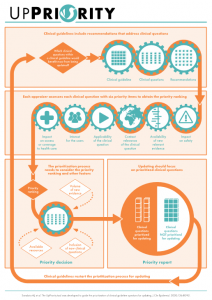
A team of researchers from the Ibero-American Cochrane Center and the IIB Sant Pau, in collaboration with other national and international authors, has shown the usefulness of the UpPriority tool to identify which questions in the clinical practice guidelines (CPG) should be prioritized for updating. This is the main conclusion of the article just published in the Journal of Clinical Epidemiology, which also highlights that the selection and training of evaluators are key aspects to successfully apply this tool.
CPGs can become out of date and lose their validity. Prioritizing the CPG questions for updating can guarantee that the available resources, always limited, are invested in the most relevant areas for the health system. UpPriority is a pragmatic proposal to determine which clinical questions included in a CPG need to be updated on a preferential basis. The tool consists of six items: 1) impact of outdated recommendations on safety, 2) availability of new relevant evidence, 3) relevance of the context of the clinical question, 4) methodological applicability of the clinical question, 5) interest of the users and 6) impact on access to medical care. It also includes a detailed guide to applying the tool.
A total of 30 evaluators have applied UpPriority for the first time in four CPGs of the Spanish National Health System (on chronic heart failure, hereditary retinal dystrophies, menopause and open-angle glaucoma). The set of four CPGs included 107 questions that, after applying the tool, were classified as high priority (16 questions; 15%), medium priority (47 questions; 43.9%) and low priority (44 questions; 41 ,1%). The experts who have implemented UpPriority have taken an average of 3.8 hours to apply it and found the tool useful.
The application of UpPriority has followed a seven-step process: 1) establishment of the working group for implementation, 2) mapping of the questions and recommendations of the original CPG, 3) development of a form to prioritize the questions, 4) evaluation of the priority of the questions according to six items, 5) calculation and classification of the priority score, 6) decision of the prioritized questions for updating, and 7) development of the prioritization report. Finally, the researchers evaluated the implementation process, the agreement between evaluators, and made suggestions for improvement.
“UpPriority is a rigorous and transparent tool. And with this work we show that it is easy to use and that it can be applied in a real setting to identify which clinical questions of a CPG should be prioritized for its updating”, says Andrea Juliana Sanabria, first author of the work. The prioritization of the questions is an important step to update the CPGs using the available resources efficiently.
 Reference
Reference
Sanabria AJ, Alonso-Coello P, McFarlane E, Niño de Guzman E, Roqué M, Martínez García L, et al. The UpPriority tool supported prioritization processes for updating clinical guideline questions. J Clin Epidemiol. 2021;139:149-159. (Free access until 23.10.2021)